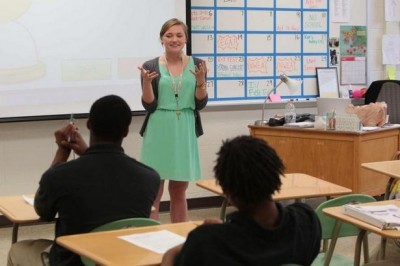Teaching may be attracting a more academically successful group of people compared to previous years, according to a new study released Wednesday.
Two researchers at the University of Washington examined four national data sets to determine how the characteristics of first-year teachers changed between 1993 and 2010. The study found that more new teachers have advanced degrees than ever before. During the 2007-08 school year, 26 percent of new teachers entered the classroom with a master’s degree, compared to 17 percent two decades earlier.
 First-year teachers during the 2008-09 school year had an average SAT score that was 8 percentile rank points higher than the average score among new teachers in 2001. And for the first time, new teachers in 2008 had slightly higher average SAT scores than their peers entering other fields.
First-year teachers during the 2008-09 school year had an average SAT score that was 8 percentile rank points higher than the average score among new teachers in 2001. And for the first time, new teachers in 2008 had slightly higher average SAT scores than their peers entering other fields.
Research has found that a master’s degree does not necessarily guarantee, or even improve teacher quality. But a teacher’s cognitive skills and literacy skills, as measured by the SAT or other national exams, have been found to positively impact student achievement.
“The data are encouraging,” wrote the authors of the study, Dan Goldhaber and Joe Walch. “[This] may represent a reversal of the long-term trend of declining academic talent entering teaching.”
For years, colleges of education have battled reputations that they attract students with low test scores and grade point averages. According to a 2011 College Board report, SAT takers planning to major in education scored an average of 480 in reading—above some, but below most disciplines, including law, engineering, and psychology.
In 2006, Arthur Levine, the former president of Teachers College, Columbia University, published a lengthy report on the state of teacher education, calling it a “troubled field” and criticizing schools of education for having low admission and graduation standards, and “wide disparities in institutional quality.” Aspiring teachers in California, for example, must only score a 51 percent on the California Basic Educational Skills test, which is a required exam for those applying to any teacher preparation programs in the state.
Nationally, there has been a push to improve the quality of teacher candidates. In February, the Washington D.C. based Council for Accreditation of Educator Preparation proposed new standards for teacher preparation programs, including increased candidate quality and selectivity. The standards suggest that schools only admit candidates with a minimum average GPA of 3.0, and call for each admission group to have an average performance in the top third of scores on academic-admissions tests like the ACT.
Earlier this year, the state of Delaware raised admission standards for the state’s teacher-preparation programs, requiring an average GPA of 3.0 or in the top 50th percentile for recent coursework. New Jersey is considering similar legislation, and the State University of New York announced this year that beginning in 2015, students must have a 3.0 GPA and pass a new exam to qualify for the teacher preparation program.
The study’s authors say they are unsure why new teachers are of a higher academic caliber, but suggest that it may have to do with the labor market. In 2001, the unemployment rate was only 5 percent, according to the Bureau of Labor Statistics. By 2009, the rate had increased to 9 percent, possibly prompting more high-scoring graduates to pursue relatively stable teaching jobs instead of occupations impacted by the economy. “It is unclear,” the authors wrote, “whether this improvement reflects a temporary response to the economic downturn or a more permanent shift.”



